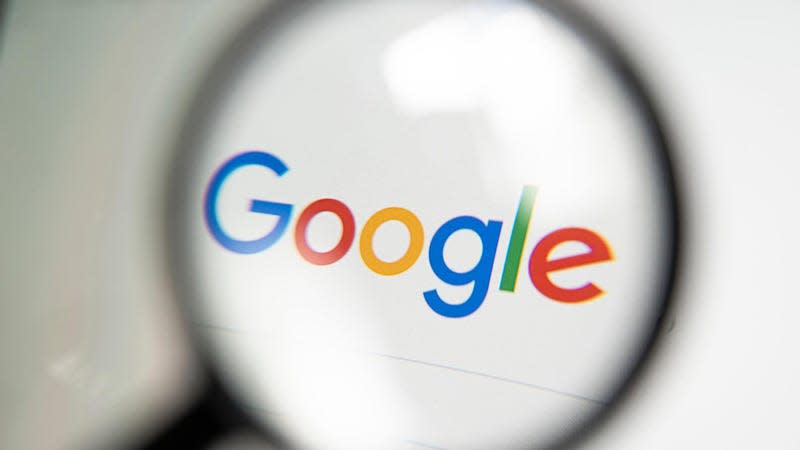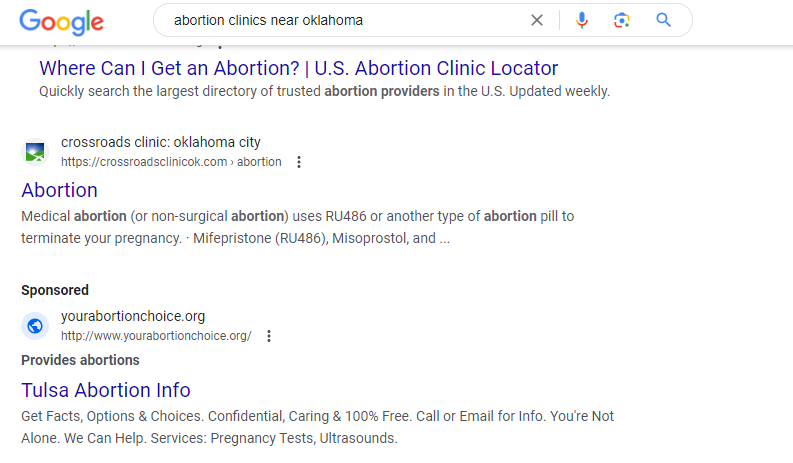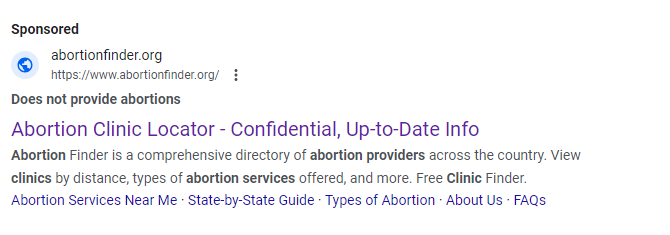Google Earned an Estimated $10.2 Million Showing Ads for Misleading Anti-Abortion Centers

A new report from the Center for Countering Digital Hate puts Google’s search and ad practices under the magnifying glass once again.
Google has received an estimated $10.2 million over the past two years for promoting misleading anti-abortion centers in its search results, according to a new report from the non-profit Center for Countering Digital Hate (CCDH). The analysis highlights how the internet’s biggest search provider tacitly profits off of advertisements that can harm users.
Often called “crisis pregnancy centers” these anti-abortion facilities tend to pose as medical clinics. However, they exist solely to sway abortion seekers away from abortion care—often by providing incorrect information or running down the clock. They outnumber actual abortion providers across the U.S., by 3 to 1, according to a 2021 research report from gender equality advocacy group, The Alliance. Even in places like New York City—considered bastions of abortion access—anti-abortion centers still reign supreme, per a 2022 New York Times report.
CCDH argues that Google is complicit in the problem. “Google is a willing participant and supporter of the fake clinic industry, profiting from – and even subsidizing – the anti-choice lobby’s campaigns,” CCDH’s CEO, Imran Ahmed, said in a statement accompanying the report.
Read more
In addition to accepting millions of dollars to promote fake clinic sites, in some cases, Google also offers these websites free advertising. The company’s non-profit grant system allows anti-abortion organizations promoting misleading crisis pregnancy centers to access thousands of dollars in subsidized ad credits along with Google marketing tools, per the report.
In its analysis, CCDH identified 976 total fake clinic sites and determined that 188 had paid to advertise on Google in the past two years. Over that time period, anti-abortion advocacy groups spent about four times as much on ads for fake clinics as they did for transparent and overt anti-abortion campaigns. Spending on fake clinic ads was highest in states where abortion is legal. CCDH found that advocacy groups shelled out $7.3 million in these states vs. $1.6 million in the 13 states where abortion is now outright illegal “This suggests that the anti-choice movement is focusing its resources on ads aimed at misdirecting people who are legally entitled to access abortion care,” the report notes.
Of the 188 anti-abortion center websites that CCDH identified as advertising on Google, the misinformation watchdog found that 71% employed one or more misleading techniques to attempt to stop abortion seekers from accessing care. 16% promoted false health information on their websites like that abortion increases breast cancer risk, though many large scientific studies show no link between breast cancer and abortion. 38% did not clearly state on their website homepage that they don’t offer abortions. 40% promoted scientifically unsupported medication abortion “reversals.”
This last category amounts to websites offering unproven medical claims and services, despite Google previously stating that it prohibits ads containing such claims and would remove them, according to CCDH. Google’s ad policy also specifically notes that it does not allow ads that promote abortion “reversal” pills—yet still, the non-profit group estimates that Google made $2.6 million over two years advertising sites that offer such pills.
Moreover, many of these anti-abortion clinics advertising on Google don’t even exist. They have websites but no physical location. Calling their phone number often directs clients to an anti-choice call center, as highlighted in a 2022 New York Times investigation. Google accepted more than $1.1 million in ad money from such sites between March 2021 and March 2023, per the CCDH.
Fake clinics paid Google to show their ads in searches for more than 15,000 different queries including “planned parenthood” “abortion clinic near me” and “abortion pill.” CCDH reports that anti-abortion groups also targeted “abortion tourism” by placing ads for crisis centers specifically in search results for regarding locations where abortion remains legal.
The non-profit group’s data from between March 2021 and February 2023 shows that the bulk of this spending and advertising happened in the lead-up to the Dobbs SCOTUS decision that overturned Roe v. Wade protections.
The issue of anti-abortion centers advertising on Google is not a new one—it goes back years. Previous CCDH reports, a Gizmodo investigation, and analysis from elsewhere have shown that such misleading ads are persistent on the platform.
Google has stopped far short of banning such ads—likely in part because of political pushback. However, the company has made multiple changes to attempt to clarify when an ad is for an actual abortion clinic vs. an anti-abortion center. In search, sponsored results are labeled “provides abortions” or “does not provide abortions.” Following the widely publicized June 2022 CCDH report, the same labels are also now applied to all results in Maps, sponsored or otherwise. These labels used to be light gray, but are now shown in black, bolded text. Google openly admits it made these changes because of CCDH’s past report.
Yet improvements aside, there are still clear issues. On a quick search, Gizmodo found that Google appears to be misapplying these labels in some cases. An anti-abortion group at the URL yourabortionchoice.org claiming to have a clinic in Oklahoma, where abortion is now illegal, was labeled by Google as “provides abortions.” It does not.

yourabortionchoice.org is NOT an abortion provider, despite Google’s label.
On the flip side, a legitimate and trustworthy resource for finding abortion clinics, Abortion Finder, was labeled by Google as “Does not provide abortions.” Technically this is true. Abortion Finder does not directly provide abortions. However, it doesn’t claim to and it does help direct people to clinics where they can receive abortion care. Labeling Abortion Finder in the same way that Google labels deceptive fake clinics makes the tool seem illegitimate when it’s probably a better method to search for abortion assistance than Google itself.

Abortion Finder is a useful tool for helping abortion seekers to access appropriate and relevant care. So why does Google label it in a way that makes it seem less legit?
Asked about both of these examples, Google spokesperson Michael Aciman told Gizmodo, “The ad from abortionfinder.org is properly labeled. The ad you shared from yourabortionchoice.org had the incorrect disclosure and we’ve corrected the issue.” Presumably, more errors are out there.
In a statement from a company spokesperson on the new CCDH report, Google further wrote:
We require any organization that wants to advertise to people seeking information about abortion services to be certified and clearly disclose whether they do or do not offer abortions. We do not allow ads promoting abortion reversal treatments and we also prohibit advertisers from misleading people about the services they offer. We remove or block ads that violate these policies. We know that people come to Google looking for information they can trust during deeply personal moments and are committed to ensuring advertisements on this topic are clear and easily understood.
More from Gizmodo
Sign up for Gizmodo's Newsletter. For the latest news, Facebook, Twitter and Instagram.

